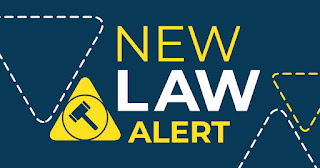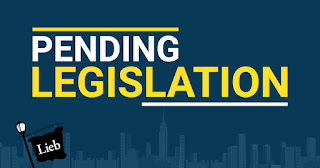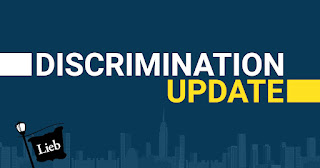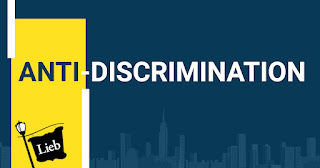In this interview on Scripps News, Discrimination Attorney Andrew Lieb discusses a new report from the UN Human Rights Committee that spotlights ongoing discrimination faced by the LGBTQ community in the United States. Lieb analyzes the committee's concerns about discriminatory laws targeting transgender people at the state level. He also addresses issues around employment discrimination, suicide rates in the LGBTQ community, and whether legal protections for LGBTQ individuals have expanded in recent years. This important conversation provides insight into the challenges that still exist and the ongoing fight for equality.
Wednesday, November 22, 2023
Monday, November 20, 2023
Common Area Cameras Illegal at Residential Buildings
Starting on 11/17/2023, security devices are prohibited on entries to residential buildings without express authorization.
Specifically, new GBL 390-e states that "any keyless security device used to control and secure access to the common areas of any residential building without the express written consent of the owner, board of managers, board of directors, or authorized party of such property" is prohibited.
Protecting Survivors: NYS Bill Prohibits Financial Penalties in Nondisclosure Agreements
On November 17, 2023, Governor Hochul signed Bill A00581, amending NYS' General Obligations Law to prohibit settlements, or other resolution, of sexual harassment claims or any other form of unlawful discrimination from including any term or condition that requires the survivor to pay the defendant liquidated damages if the complainant violates a non-disclosure agreement.
Survivors of sexual harassment and discrimination are often required to sign non-disclosure agreements (NDA) as a condition for receiving compensation for their horror. NDAs frequently include provisions requiring survivors to pay liquidated damages (predetermined damages) if they violate the agreement and these damages can be devastating.
As a result, survivors, who later change their minds or those who were coerced into signing an NDA, face financial hardships for speaking out about their experience. This new law will protect survivors by no longer allowing financial penalties against them for sharing their stories about experiencing harassment and discrimination.
This Bill takes effect immediately and will apply to agreements entered on or after its effectiveness Agreements can no longer require the survivor to forfeit part or all of the consideration for violating an NDA. Additionally, defendants can no longer require survivors to sign an affirmative statement, assertion, or disclaimer stating that they were not subject to discrimination or retaliation.
Friday, November 17, 2023
Terminating a Lease of a Decedent as an Executor / Administrator
Tuesday, November 14, 2023
New Law for Foreclosures / Evictions with Deed Theft
On November 14, 2023, Governor Hochul enacted A06656, amending Section 756-a of New York State's Real Property Actions and Proceedings Law. This amendment is designed to safeguard real property owners from the threat of not resolving claims of potential deed theft fast enough while an eviction or foreclosure is pending.
This amendment permits a stay of any proceeding to recover possession of or resoling title disputes concerning residential properties when there are underlying issues of deed theft or title disputes. This provision applies specifically when there is a pending good faith investigation into the theft or fraud in the title to, or the financing of, the premises that is the subject of any proceeding for eviction or foreclosure.
If an individual is convicted of a criminal offense related to deed theft or fraudulent transactions involving real property, this conviction gives rise to a rebuttable presumption of fraud in the deed transfer, so filing charges needs to be part of a strategic litigation strategy moving forward. In fact, if you file, the District Attorney or Attorney General is then entitled to seek the nullification of the deed transfer. The implicated individual must establish by a preponderance of the evidence that the deed was not procured through fraudulent means.
This amendment goes into effect December 14, 2023.
Enhancing Utility Workers Rights: New York Assembly Bill A06978
Key Features of the Bill:
- Restroom Access for Utility Workers: Public utility employees can use employee restroom facilities in businesses during work hours.
- Conditions for Access: Access is allowed when the worker is on duty, with at least two employees of the business present, and when it doesn't pose safety or security risks.
- Compliance and Penalties: Businesses must comply or face a fine of up to $500 per violation, but are not liable for injuries to utility workers using their facilities.
This bill recognizes the essential services provided by utility workers, addressing a basic need for restroom access during their duties. It balances the needs of these workers with the practical and safety concerns of businesses. A06978 is a step towards respecting the dignity and rights of utility workers in New York.
Attorney Andrew Lieb Debates Nike Patent Lawsuit on Newsmax TV
Understanding NY's New Legislation: More Time to File Discrimination Claims
New York State Assembly Bill A00501 represents a pivotal change in the state's approach to handling discrimination cases. Historically, the timeframe for raising claims under the New York State Human Rights Law was restricted - only 90 days for court proceedings against the government and a maximum of one year for bringing issues to the Division of Human Rights, with the sole exception of sexual harassment cases. The introduction of this bill, however, marks a significant shift, extending the statute of limitations to three years across the board for filings with the Division of Human Rights for claims against both private and public entities. This is biggest for education discrimination lawsuits that often were capped at a one year lookback period.
Increased Access to Justice: The extension from one year to three years dramatically broadens the opportunity for individuals who have experienced discrimination to seek legal redress against the government. This is particularly crucial in cases where the complexity of the situation or the victims' circumstances might delay the decision to pursue legal action.
Benefit to School Discrimination Cases: The most notable impacts of this bill will be in the context of school systems. Previously, students or parents alleging discrimination had a mere year to initiate legal action. The extension to three years provides a more reasonable timeframe to prepare and pursue these important cases.
Click here to read Bill A00501.
Failing to Comply with Mandatory Sexual Harassment Training Law - Lawsuits Are Happening
Labor Law 201-g went into effect on October 9, 2018.
Did you know that Plaintiffs (sexual harassment victims) are suing companies for failing to comply with this mandatory training and disclosure law?
In December of 2018, New York County saw its first lawsuit alleging that a "Plaintiff was injured, in whole or in part, as a result of CIRE's failure to comply with NYC Admin Code § 8-107(29) and Labor Law § 201-g."
The case was about a "hostile, offensive, abusive and otherwise inappropriate work environment."
Allegedly, this harassment included:
- Asking Plaintiff if he was single;
- Asking Plaintiff to go out with her for drinks and dinner, unrelated to business;
- Telling Plaintiff how handsome he and flirting with Plaintiff;
- Complimenting Plaintiff's choice of clothes;
- Telling Plaintiff he should have a girlfriend;
- Telling Plaintiff that having a girlfriend would afford him a health insurance entitlement, which "by the way I, Sarine have health insurance";
- Telling Plaintiff what color clothing he should be warning;
- Moving her desk next to Plaintiff's desk;
- Staring at Plaintiff at all hours of the day and commenting on his face or hair;
- Standing unnecessarily close to Plaintiff when speaking;
- Inappropriately attempting to give Plaintiff hugs and kisses;
- Demanding that Plaintiff "pinky swear" so that he not disclose something that occurred between Ms. Atamian and another employee, just so she could touch Plaintiff's hand;
- Unnecessarily interrupting Plaintiff's conversations with others;
- Demanding that Plaintiff open personal packages and mail in front of her;
- Requiring that Plaintiff make all requests for basic company information, documentation, etc., through her, where other brokers were permitted to engage in such activities on their own.
- Making inappropriate inquiries concerning what Plaintiff was doing, who he was with, etc. when he was not at the Office;"
In fact, the Plaintiff argued that this violation of Labor Law § 201-g should result in Christie's International Real Estate Group, Inc. and two individual parties, paying "compensatory damages, punitive damages, statutory damages and special damages, as well as his costs, fees (including attorneys' fees) and disbursements, plus pre and post judgment interest, in amounts to be determined at trial, which amounts exceed the jurisdictional minimums of this Court"
Have you scheduled your annual training yet?
Wednesday, November 08, 2023
Lieb at Law Advocates for Justice in Case of Discrimination Against Autistic Child
Andrew Lieb, the attorney for Ava's family, encapsulates the gravity of the situation: "First and foremost, we want to get Ava the compensation she deserves from the trauma from torture to be able to get the services she needs," highlighting the pursuit of justice and Ava's right to respectful and appropriate care.
This complaint comes amidst other allegations against Adelbrook, suggesting a potentially worrying pattern of behavior by the organization. As the legal process unfolds, Lieb at Law is dedicated to bringing the facts to light and ensuring that Ava receives the justice she deserves.
This case is particularly concerning given the backdrop of previous allegations of abuse within Adelbrook, as reported by the Connecticut Inside Investigator journal. The coverage of this story can be found here, offering a comprehensive look into the unfolding events.
Monday, November 06, 2023
NY's Bold Move: A Bill to End AI Discrimination in Housing
In a landmark move to safeguard equity and fairness in housing, New York State Senator Cleare has introduced Bill S7735, which aims to address potential discrimination through the use of automated decision-making tools in housing. The bill was read twice and is now committed to the Committee on Rules for further deliberation.
Background:
Automated decision tools, based on algorithms and artificial intelligence, are increasingly used by landlords and housing agencies to make decisions about who gets housing. While these tools can streamline processes, there is a growing concern that they may inadvertently discriminate against protected classes. Bill S7735 is set to provide a regulatory framework ensuring these tools are used responsibly and without discrimination.
Key Provisions of the Bill:
- Definition and scope of automated decision tools.
- Requirement for annual disparate impact analyses to assess potential discrimination.
- Mandate for transparency and public reporting of the analyses.
- Obligation for landlords to notify applicants when such tools are used.
- Empowerment of the Attorney General and Commissioner to investigate and act upon violations.
This bill is a step forward in the use of technology in housing decisions, ensuring that while innovation continues to evolve, it does not come at the cost of fairness and discrimination-free practices.
Newsmax: Attorney Andrew Lieb Breaks Down Michael Cohen's Testimony Against Trump
Legal analyst Andrew Lieb joins Newsmax to discuss Michael Cohen's involvement in the civil fraud case against Donald Trump. Lieb provides context on Cohen's role as Trump's former fixer and explains how Cohen clarified his statements about Trump's direction during cross examination and redirect on the witness stand.
Tuesday, October 31, 2023
Mortgage Lending Discrimination: NY AG's Report & Proposed Solutions
On October 31, 2023, the NY AG Letitia James released a report detailing racial disparities in homeownership and financing throughout NY while calling to enhance the state's anti-discrimination law, the New York State Human Rights Law (NYSHRL).
The Report highlights that mortgage applicants of color are denied mortgages at nearly double the rate of white applicants, regardless of credit score, income, size of the loan, and other factors. Plus, they are more likely to be charged higher interest rates on their loans and less likely to be approved to refinance to lower rates. These higher costs total over $200 million extra to minorities.
The Report calls for the strengthening the NYSHRL to explicitly cover disparate impact discrimination based on race, including increased enforcement against lenders. In fact, it has a 3 step plan:
- Obtain increased $$ for government agencies to conduct fair lending work.
- Strengthen NYSHRL to prohibit lenders from engaging in discrimination any practice by requiring lenders to have a legitimate and nondiscriminatory justification for their actions.
- Passing Senate Bill 795 to prohibit unfair business practices.
If you'd like to read more about the report click here.
Monday, October 30, 2023
AI Discrimination Being Regulated by President Biden's New Executive Order
On October 30th, 2023, President Biden issued an Executive Order (EO) addressing discrimination caused by artificial intelligence (AI), amongst other topics.
The White House announced this EO in seeking to prevent AI from leading to and deepening discrimination, bias, and other issues in justice, healthcare, and housing.
Now, agencies will be empowered to combat algorithmic discrimination, while enforcing existing authorities to protect anti-discrimination rights and safety.
In summary, the Executive Order:
- Calls for clear guidelines to keep AI algorithms from being used to exacerbate discrimination by landlords, Federal benefits programs, and Federal contractors.
- Tackles algorithmic discrimination through training, technical assistance, and coordinates with the Department of Justice and Federal civil rights offices for best practices to investigate and prosecute AI civil rights violations.
- Ensures fairness throughout the criminal justice system by developing best practices for the use of AI in sentencing, parole and probation, pretrial release and detention, risk assessments, surveillance, crime forecasting and predictive policing, and forensic analysis.
The Biden Administration Blueprint for an AI Bill of Rights sets out steps those using AI can take to ensure fairness and equality. The steps include regularly checking for and addressing any biases in the design and use of AI systems, using diverse and representative data to avoid discrimination or unfair impacts, ensuring accessibility for people with disabilities during the design and development of AI systems, conducting tests to identify and address any disparities before and after the AI system is in use, providing clear oversight from organizations to ensure fairness, and conducting independent evaluations and sharing easy-to-understand reports, including test results and how any issues are being addressed, to ensure these protective measures are in place.
If companies fail to comply and use AI incorrectly to deepen discrimination and bias, this Executive Order will become the basis for discrimination lawsuits as a result of the incorrect use.
To learn more about the Executive Order click here. To read the Biden Administration Blueprint for an AI Bill of Rights click here.
Friday, October 27, 2023
NYS Amends the Banking Law to Protect Home Buyers Against Unregistered and Unlicensed Mortgage Brokers
On October 25th, 2023 Governor Hochul signed A1153A to amend New York State's Banking Laws to protect against unregistered and unlicensed mortgage brokers.
This amendment prohibits mortgage lenders from conducting business with any individual or entity which it knows or should have known is acting as a mortgage banker or a mortgage broker without being licensed or registered with New York State's Department of Financial Services (DFS). This amendment exempts entities who provide mezzanine mortgages.
This amendment also requires a mortgage banker, mortgage broker or entities who provide mezzanine mortgages to notify DFS of any mortgage banker or a mortgage broker acting without being licensed or registered.
If non-exempt unlicensed or unregistered mortgage banker or a mortgage broker engages in unauthorized activities after DFS issues a cease-and desist notice, then that non-exempt unlicensed or unregistered mortgage banker or a mortgage broker is liable for the actual damages equivalent to the amount of money paid to the person affected.
This amendment goes into effect November 7th, 2023, which is the 13th days after it became a law. Click here to read the law.
Thursday, October 26, 2023
NYS Amended the Education Law to Prohibit Corporal Punishment in Private Schools
On October 25th, 2023 Governor Hochul signed A05010 to amend New York State's education law to prohibit religious private school and non-religious private schools from using corporal punishment on students. This amendments is effective as of October 25th, 2023.
The bill discusses how every two years, the US Department of Education asks every public school in the country to report on the number of students it has physically punished during the previous year. In an analysis of that data it was revealed that males, young persons of color and students diagnosed with a disability are significantly more likely to be the victims of this abuse by their teachers and school administrators.
If you are male, person of color, or have been diagnosed with a disability and received corporal punishment at a private school in New York within the last year, you may have a claim for discrimination under New York City Human Rights Law ("NYS Human Rights Law").
If you are a male, person of color, or have been diagnosed with a disability and received corporal punishment at a private school in New York not within a year you may still have a national claim.
For males who were enrolled in a religious private school in the last 3 years you may be able to submit gender discrimination claim under Title VI claim. However, Title VI does not include emotional distress damages.
For persons of color who were enrolled in a private school in the last 4 years you may be able to bring a disparate treatment case, under 1981 and get emotional distress damages. You may also be able to submit a Title VI claim but this won't include emotional distress damages.
For persons with a diagnosed disability who were enrolled in a private school in the last 3 years you may be able to bring a claim under the Americans with Disability Act and are not limited to non-emotional distress damages.
If you are not a New York resident you still may have a national claim under Title VI, 1981, and/or Americans with Disability Act. Check your state's local laws to see if you potentially have a claim under state law.
To read more about this amendment to the education law click here.
NYS Protects Homeowners from Discrimination by Real Estate Appraisers in New Addition to the State's Human Rights Law
On October 25th, Governor Hochul signed A06833 adding additional protection to New York State's Human Rights Law making it clear that discrimination of any kind is unacceptable in New York. This addition is effective as of October 25th, 2023.
This addition will protect Homeowners from being discriminated against by Real Estate Appraisers based on the Homeowner's protected characteristic, including race, creed, national origin, sex, age, disability, marital status, military status, family status, sexual orientation, or gender identity.
With this addition the Department of State will be able to revoke, or suspend the license of a Real Estate Appraiser found to be in violation of the Human Rights Law.
New York State felt this addition was necessary after it was revealed that Real Estate Appraisers in Illinois, California, Florida, and Connecticut had been found to lower appraised home values by up to 50% based on what the Appraisers find in the home including, cultural pieces, books written by people of color and family photos of people of color that were left out in plain view.
New York State is making sure these discriminatory practice does not take place in New York and this addition to the Human Rights Law will discourage these discriminatory acts.
If you were discriminated against by a Real Estate Appraisers in New York within the last 3 years, you may have a claim under New York State's Human Right Laws.
To read more about this addition to New York State Human Rights Law, click here.
Lieb at Law is Hiring: Litigation Associate For High Impact Cases!
- Handle litigation in Plaintiff, Defense, and Appeals. Fields of practice include Civil Rights/Discrimination, Employment, Real Estate Litigation, Real Estate Brokerage, & Commercial Litigation.
- Draft pleadings, manage discovery, draft / oppose motions, ADR, administrative proceedings, prepare trials, and draft appeals.
- Collaborate effectively within a collegial team environment.
- JD
- Admitted to the New York State Bar (a plus, but will consider 2023 graduates who just passed the NY Bar)
- 1+ years of litigation experience, ideally within a private law firm context
- Proficiency in drafting compelling legal motions
- Skilled in legal research; experience with Westlaw is a plus
- Strong organizational, critical thinking, and persuasive communication skills, both written and verbal
- Familiarity with employment litigation, discrimination litigation, real estate litigation and commercial litigation will be advantageous














